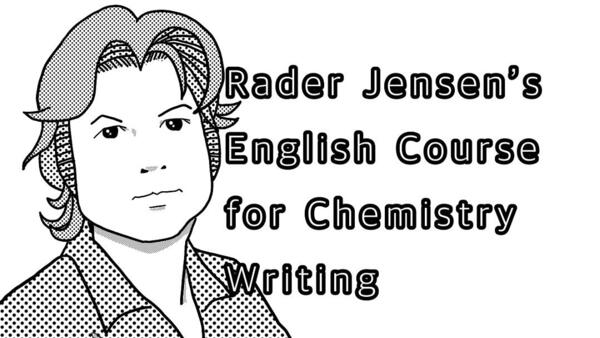CSJ Journals
[化学論文のための英語講座] 第20回:助動詞 will
(English version is here.)
助動詞は主語によって変化せず、進行形や完了形もありません。基本の形は「主語+助動詞+動詞の原形」です。まずは「will」を見てみましょう。
willは研究論文で頻繁に使われます。「主語 + will + 動詞の原形」で未来の予測を述べます。例文を見てみましょう。
1. Application of photocatalytic water splitting will require improved separation gas membranes.
訳文:光触媒による水分解の活用には、改善されたガス分離膜が必要になる。(高い確率)
「will」の過去形は「would」です。過去の予測を述べます。
2. Literature precedence suggested that the reaction would lead to a mixture of products.
訳文:先行文献は、その反応が生成物の混合物になることを示唆した。
「would」は予測や仮定を述べる役割もあります。この構文は研究論文では頻繁に現れます。
3. Lowering the reaction temperature would be expected to increase selectivity.
訳文:反応温度を下げると選択性が高まると予想される。
「would」は条件文にも現れます。基本形は「 If+ 主語+助動詞の過去形+条件,主語+would+動詞の原形」です。この構文は仮定を述べます。
4a. If the complex were exposed to light, it would rapidly isomerize.
訳文:複合体が光にさらされると、急速に異性化するだろう。(まだ光にさらされていない。光にさらした場合は異性化することが期待される)
4b. If the complex is exposed to light, it would rapidly isomerize.
これは間違いです。英語圏の人も「is, would」の組み合わせをよく使いますが、「is, will」か「were, would」の組み合わせが正しいです。「is, will」は確実なことを述べて、「were, would」は期待を述べます。「is」と「would」の組み合わせは文法的に正しくありません。
4c. If the complex is exposed to light, it will rapidly isomerize.
訳文:複合体が光にさらされると、急速に異性化する。(確実)
「were, would」はまだ起こっていないが、期待できる場合に使います。「is, will」は確実な場合に使います。
疑問文でも「will」と「would」が使えます。
5. Will the phosphine be air stable?
訳文:ホスフィンは空気に対して安定になるか?(確実)
6. Would the bulky substituent inhibit the 1,2 addition?
訳文:かさばる置換基は 1,2 の付加反応を阻害するだろうか?(予想)
否定文にも現れます。
7. The alkyl phosphine will not be air stable.
訳文:アルキルホスフィンは空気に対して安定にならない。(確実)
8. Preparation of the enol ether would not be difficult.
訳文:エノールエーテルの調製は難しくなさそうだ。(予想)
[重要] 口語では短縮形「won't, wouldn't」を使いますが、研究論文では短縮形を使いません。
最後に助動詞以外の役割を考えてみましょう。「will」は名詞として「意志」という意味を持ちます。動詞として「強い意志で行う」という意味を持ちます。研究論文では滅多に使わないですが、役割を感覚的に掴むために例文をみてみましょう。
9. His mother has a strong will. (名詞)
訳文:彼の母親は強い意志を持つ。
10. I willed myself through the ordeal.(動詞)
訳文:私は試練を乗り越えた。(強い意志で)
次回はミニコーナーです。
Auxiliary verbs are invariant with respect to the subject, and have neither a perfect nor progressive case. The basic form is subject + auxiliary + bare infinitive. Let us examine will.
Will is frequently used in research papers. Subject + will + bare infinitive describes a future prediction. Let us look at an example sentence.
1. Application of photocatalytic water splitting will require improved separation gas membranes.
This sentence implies a very high probability. The past tense of will is would, and can describe a prediction that occurred in the past.
2. Literature precedence suggested that the reaction would lead to a mixture of products.
Would can also be used to express predictions or assumptions. This form frequently appears in research papers.
3. Lowering the reaction temperature would be expected to increase selectivity.
Would also appears in conditional sentences. The basic form is if + subject + past tense auxiliary + modifier, subject + would + bare infinitive. This structure expresses speculation.
4a. If the complex were exposed to light, it would rapidly isomerize.
This implies that the complex has not yet been exposed to light, however, it is expected to isomerize upon illumination.
4b. If the complex is exposed to light, it would rapidly isomerize.
This structure is incorrect. Native English speakers sometimes use this combination (is, would) as well, however, (is, will) and (were, would) are the correct combinations. The combination (is, will) expresses certainty, while (were, would) expresses expectation. Strictly speaking, the combination (is, would) is grammatically incorrect.
4c. If the complex is exposed to light, it will rapidly isomerize.
The combination (were, would) expresses the expected result of an event that has not yet occurred. The combination (is, will) expresses a certain, known condition.
Will and would can also be used to pose questions.
5. Will the phosphine be air stable? (certainty)
6. Would the bulky substituent inhibit the 1,2 addition? (expectation)
They also appear in negative sentences.
7. The alkyl phosphine will not be air stable. (certain)
8. Preparation of the enol ether would not be difficult. (expected)
Important: In the spoken language, the contractions won't and wouldn't are often used, however, in research papers contractions are seldom used.
Finally, let us consider roles other than as an auxiliary. Will as a noun carries the meaning intent or volition, and as an ordinary verb means to act with strong intent. These forms are rarely used in research papers however, to grasp these applications let us look at a couple of examples.
9. His mother has a strong will. (noun)
This means that she is determined, resolute.
10. I willed myself through the ordeal. (verb)
This means that I overcame an obstacle through determination and fortitude.
We will post mini corner at next time.
